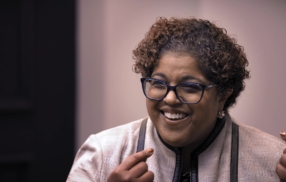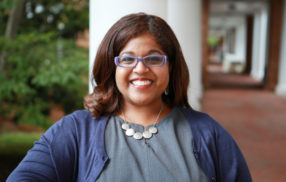Leadership Unscripted: Challenging Assumptions and Channeling the Potential of Diversity at Work
By Dave Hendrick
Why do so many companies and organizations promote diversity and inclusion efforts but fail to show meaningful results? What’s holding back real change?
A trio of workplace diversity thought leaders recently took a critical look at the state of diversity and inclusion in the workplace at a Leadership Unscripted event at UVA Darden DC Metro. The panelists — Airbnb Global Head of Diversity Melissa Thomas-Hunt and incoming Wharton School Dean Erika James, in conversation with Darden Professor Laura Morgan Roberts — are united by both thought leadership in the space and ties to the University of Virginia Darden School of Business, where both Thomas-Hunt and James previously taught and held leadership roles.
Asked to describe the most notable diversity and inclusion challenges in organizations, James cited the ongoing lack of significant numbers of people of color in leadership and leadership-track positions.
Panelists said the reasons — and excuses — for the numbers were many, and cited the common claims of a lack of qualified candidates of color, or claims that candidates with diverse backgrounds would not be “a good fit.”
“The issue of inclusion becomes framed as a question of accommodating and lowering standards, rather than a question of enhancing, strengthening and amplifying the organization,” said Roberts, whose book Race, Work and Leadership: New Perspectives on the Black Experience, was published in 2019. “How do we channel the strength, power and potential of diversity while challenging some of those misguided assumptions that people call forth so frequently?”
Exploring the Intersection of Race, Gender and Class
Thomas-Hunt, who previously served as global chief diversity officer at Darden, said building an environment that invites more people of color into leadership roles and positions them for success takes time, will and commitment, and a careful study of the process by which candidates enter an organization and the environment they find themselves in.
“What environment are we actually bringing them into? What is their experience as they come in?” said Thomas-Hunt. “Are they being embraced? What information are they being given? Are they being given the feedback that they actually need or are they struggling to make sense, because everyone is telling them they’re doing just fine?”
James, who recently announced plans to leave her role as dean of Emory University’s Goizueta School of Business to lead the Wharton School at the University of Pennsylvania, recounted her experience leading on diversity issues at Goizueta, knowing that “when you’re the dean, the buck stops with you.”
James noted dual pressures — the expectation that she would know precisely how to bring about greater diversity and inclusion given her previous research on the topic and that, as a black woman, she would bring a “personal agenda” or focus on a pet project at the expense of other facets of the school.
James said she realized she needed to get in front of any sort of misgivings by starting an open and honest dialogue.
“Part of the work that needs to be done, which is what I tried to do at Emory, was to break down the fear of having the conversation by putting it on the table myself, because no one was going to talk about diversity at the business school unless I was the one talking about diversity at the business school,” said James.
The Value of Difficult Conversations
Creating an environment of truly honest dialogue can foster an environment in which structural and social barriers that hinder diversity and inclusion efforts can be addressed, James said.
Roberts said conversations around diversity and inclusion are often treated as “happy talk,” with people too often disassociating the real issues of racial and gender inequity from generic talk about the value of diversity writ large.
“We need to change happy talk to real talk,” said James. “The differences and experiences that people have based on their [identities] are real.”
Much of one’s sense of identity is tied to race or gender, and in order for one to feel “heard and understood and respected and regarded,” racial identity has to be part of the identity that they are able to convey in an organization, James said.
Thomas-Hunt and James also both offered examples of when they knew they had a sense that they might be cut out for a leadership position. James recounted her experience as a visiting professor at the Harvard Business School at the onset of the global financial crisis. Stepping into her first class in August 2008, James said the “vulnerable and fearful” students in front of her upended her assumptions about her potential students and caused her to alter her approach to instruction. The need to react quickly to meet the needs of others felt like a lesson in leadership, she said.
James further recounted setting up a women’s leadership program in Darden Executive Education, and subsequently being asked to lead the entire Executive Education organization. She almost turned the position down, she said, but realized she needed to “talk the talk,” given her efforts to make women’s leadership a core part of Executive Education programming.
Thomas-Hunt recounted a significantly earlier experience, drawing back to a memory of second grade, when a group of boys wouldn’t let girls join a kickball team. Thomas-Hunt recalled organizing a team for girls and losing badly to the boys, but the lesson of refusing to be treated as lesser based on an innate characteristic stuck with her.
Said Thomas-Hunt, “That’s the earliest memory that I have of wanting to look at injustices, or look to help individuals who are not fully seeing the potential that they can have, and to help elevate them and to help others see them for the value that they bring to the organization.”
Listen to a podcast recording of the event.
The University of Virginia Darden School of Business prepares responsible global leaders through unparalleled transformational learning experiences. Darden’s graduate degree programs (MBA, MSBA and Ph.D.) and Executive Education & Lifelong Learning programs offered by the Darden School Foundation set the stage for a lifetime of career advancement and impact. Darden’s top-ranked faculty, renowned for teaching excellence, inspires and shapes modern business leadership worldwide through research, thought leadership and business publishing. Darden has Grounds in Charlottesville, Virginia, and the Washington, D.C., area and a global community that includes 18,000 alumni in 90 countries. Darden was established in 1955 at the University of Virginia, a top public university founded by Thomas Jefferson in 1819 in Charlottesville, Virginia.
Press Contact
Molly Mitchell
Senior Associate Director, Editorial and Media Relations
Darden School of Business
University of Virginia
MitchellM@darden.virginia.edu





